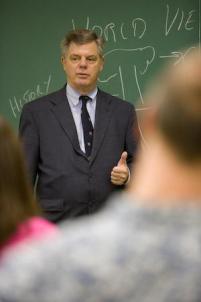Dr. Edgar Reporting, Part 1
July 21, 2009

Rev. Dr. David B. Garner asked
Dr. William Edgar to report on his
Calvin 500 experience...
"Happy Birthday John Calvin! Unless you are living on another planet, you will know that 2009 marks the 500th anniversary of Calvin, who was born in Noyon, north of Paris, July 10th 1509. One of the two or three most influential theologians of all times, along with Augustine and Thomas Aquinas, Calvin deserves this kind of attention, though he would have hated it were he around. Contrary to the popular caricature, he was so humble that he asked that his grave be unmarked...."
"There have been scores of colloquia during the year, each one measuring his life, his writings, his impact in different ways. I have participated in three of them so far, with more to come. For two of them Barbara and I were together with Dr. and Mrs. Peter Lillback and our good friends Joe and Jeannie Roskos. Each has been informative, edifying and even inspirational. Yet, as one of my former colleagues, Paul Wells (M. Div. & D.D. from Westminster) warns, we must be neither Calvinophobes nor Calvinolaters! Unfortunately, both tendencies have had a long history. Instead, though, it is right to be Calvinophiles, since there is so much to love in the man, his work, and his legacy.
"Jean Cauvin (1509-1564) fled his native France because of persecutions against the growing Protestant movement with which he identified. He was persuaded to stay in Geneva, where he became the consolidator and developer of the Reformation in that city and well beyond. He preached thousands of sermons, and wrote voluminously. His masterpiece, a classic of religious literature, is the Institutes of the Christian Religion, a defense and elaboration of biblical truth covering every important doctrine of our faith. No doubt he, more than any other Reformer, was the human instrument for developing what we now call the Reformed Faith, which includes Presbyterianism, and, of course, Westminster Seminary.
"The first colloquium was jointly sponsored by the Reformed Seminary in Aix-en-Provence (FLTR) and the Evangelical Seminary in Vaux-sur-Seine (in two episodes, in February at Aix and in March at Vaux). The two are the only evangelical graduate schools in France. Entitled, “The Significance of John Calvin: Theologian, Churchman, and Exegete,” the presentations were remarkable. Highlights were Olivier Millet’s lecture on Calvin as biblical interpreter, Henri Blocher on Calvin and justification, and Frédéric Hammann on Calvin the preacher. I was able to present an address on Calvin and iconoclasm, a version of which I would do in English, later, in Geneva. Perhaps the most moving part of the colloquium was the devotions, largely based on Calvin’s prayers, led by Gilles Daudet, a graduate from Aix who is presently the pastor of a vital Reformed Church in Paris. Daudet has actually published a marvelous book, Priez 15 Jours avec Calvin, which can be used for personal or corporate prayer, provided you know French!
"The second colloquium was in three parts. Westminster was one of the official sponsors. Superbly organized by the Rev. David Hall, Pastor of Midway Presbyterian Church (PCA) in Powder Springs, GA, it was titled, Calvin500. David dedicated the better part of three years to preparations for this, and all I can say is, thank you, David, for an incredible job! The first portion, “A Taste of Calvin 500,” was held in Orlando, in tandem with the PCA ‘s General Assembly in June. The event was hosted by Reformed Theological Seminary, and, again, the presentations were superb. Particularly memorable for me was Douglas Kelly, who lectured on the newly transliterated Consistory Minutes from the church at Geneva. His conclusion, after examining hundreds of hours of session records, is that very little has changed in the life of the church over the years! Other speakers included Michael Milton, Frank James, Derek Thomas, Ligon Duncan, and David Hall. I was able to show a Power Point illustrating Calvin’s impact on the arts, particularly Rembrandt, and the 17th century Dutch landscapists..." - Dr. William Edgar
CALVIN 500 website
TO BE CONTINUED







